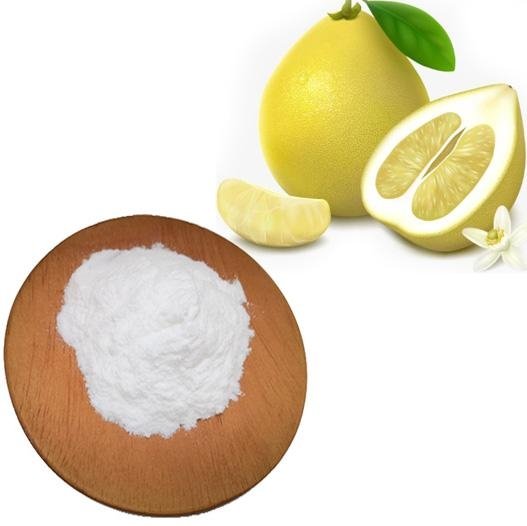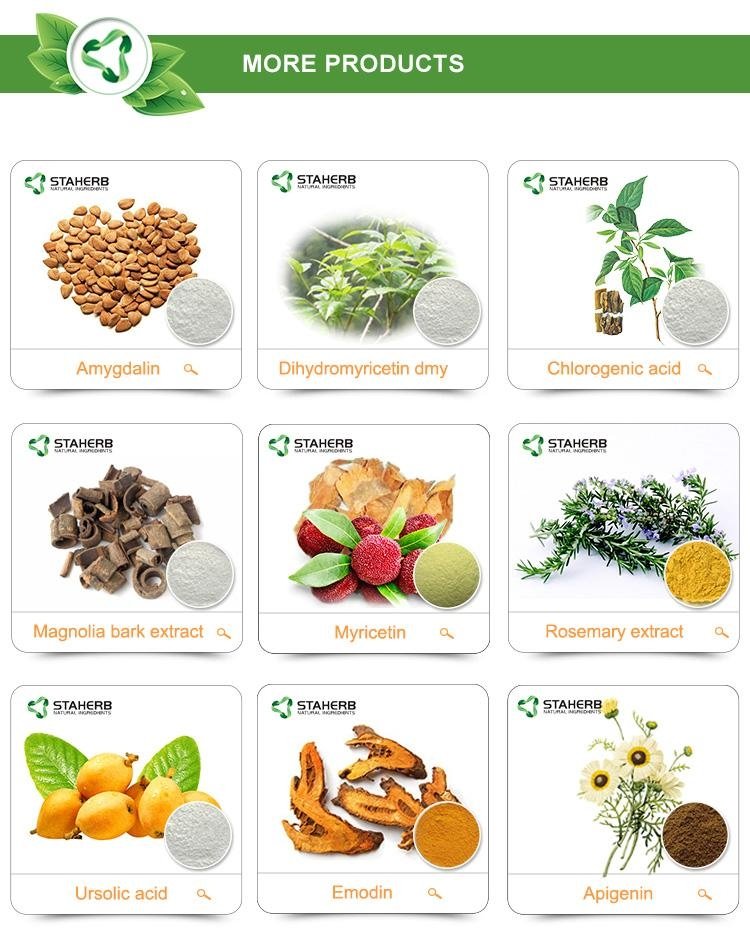
Naringin 98%
Product Name: Naringin 98%
Cas No.: 10236-47-2
Specification: 98%
Testing Method: HPLC
Appearance: Light yellow to off white powder
MF: C27H32O14
MW: 582.55

grapefruit seed extract naringin
Naringin is a dihydroflavonoid. Since there is no conjugate between the A ring and the B ring, there is a strong ultraviolet absorption peak at 282 nm, which makes naringin show various biological activities and pharmacological effects. It has anti-inflammatory, anti-viral, anti-cancer, anti-mutation, anti-allergic, anti-ulcer, analgesic, antihypertensive activities, can lower blood cholesterol, reduce the formation of blood clots, improve local microcirculation and nutrient supply, can be used to prevent heart and brain Vascular diseas.
| Grapefruit extract |
||||
| Active Ingredients |
Specs |
Test Method |
Appearance |
Solubility |
| Naringin |
95%-98% |
HPLC |
Off white powder |
partially soluble in hot water, methanol, ethanol |
| Naringenin |
95%-98% |
HPLC |
Off white to white powder |
Soluble in ethanol |
| Naringin Dihydrochalcone |
98% |
HPLC |
Off white to white powder |
Soluble in hot water |
Naringin Main function:
1.Grapefruit seed extract naringin is used to treat hundreds of adverse health conditions in humans and animals alike.
2.Grapefruit seed extract naringin can help prevent damage to human liver cells caused by chemotherapy medications.
3.Grapefruit seed extract naringin can be used externally as a disinfectant for both intact skin and to prevent infection in wounds.
4.Grapefruit seed extract naringin has anti-inflammatory analgesic, anti-viral, antibacterial and aldose reductase inhibitory effect of the eye.
5.Grapefruit seed extract naringin is used to treat a range of health problems related to free radical damage, including heart disease, diabetes, and cancer.
6.Grapefruit seed extract naringin is in high sweetness, low calorific value, non-toxic, and security features, can be used in food, medicine and daily chemical industry.
Naringin Application:
1.Applied in cosmetic field, as raw material to added into cosmetic, grapefruit seed extract naringin can delay skin aging.
2.Applied in food field, grapefruit seed extract naringin is mainly used in kinds of beverage, liquor and foods to enhance human immunity and anti-aging.
3.Applied in pharmaceutical field,grapefruit seed extract naringin is usually made into tablets, capsule and granule to warm the kidney, strengthen the spleen and enhance human immunity.
For more product information pls kindly contact email sales09@staherb.cn

References:
- 1.
Beltran A, Marce RM, Cormack PAG, Borrull F (2010) Synthetic approaches to parabens molecularly imprinted polymers and their applications to the solid-phase extraction of river water samples. Anal Chim Acta 677:72–78
- 2.
Shen ZL, Yuan D, Su QD, Zhang H, Wang J, Zhu JH, Liu YM (2011) Selective solid-phase extraction using molecularly imprinted polymer for analysis of methamidophos in water and soil samples. Biosci Biotechnol Biochem 75:473–479
- 3.
Baggiani C, Baravalle P, Giraudi G, Tozzi C (2007) Molecularly imprinted solid-phase extraction method for the high-performance liquid chromatographic analysis of fungicide pyrimethanil in wine. J Chromatogr A 1141:158–164
- 4.
Advincula RC (2011) Engineering molecularly imprinted polymer (MIP) materials: developments and challenges for sensing and separation technologies. Korean J Chem Eng 28:1313–1321
- 5.
Barde LN, Ghule MM, Roy AA, Mathur VB, Shivhare UD (2013) Development of molecularly imprinted polymer as sustain release drug carrier for propranolol HCL. Drug Dev Ind Pharm 39:1247–1253
- 6.
He JF, Zhu QH, Deng QY (2007) Investigation of imprinting parameters and their recognition nature for quinine-molecularly imprinted polymers. Spectrochim Acta A 67:1297–1305
- 7.
Mayes AG, Whitcombe MJ (2005) Synthetic strategies for the generation of molecularly imprinted organic polymers. Adv Drug Deliv Rev 57:1742–1778
- 8.
Jagetia GC, Reddy TK (2005) Modulation of radiation-induced alteration in the antioxidant status of mice by naringin. Life Sci 77:780–794
- 9.
Zhai YK, Niu YB, Pan YL, Li CR, Wu XL, Mei QB (2013) Effects of naringin on proliferation, differentiation and maturation of rat calvarial osteoblasts in vitro. China J Chin Mater Med 38:105–111 (in China)
- 10.
Okutucu B, Önal S (2011) Molecularly imprinted polymers for separation of various sugars from human urine. Talanta 87:74–79
- 11.
Hqupt K, Mosbach K (2000) Molecularly imprinted polymers and their use in biomi-metic sensors. Chem Rev 100:2495–2504
- 12.
Bitar A, Fessi H, Elaissari A (2012) Synthesis and characterization of thermally and glucose-sensitive poly N-vinylcaprolactam-based microgels. J Biomed Nanotechnol 8:709–719
- 13.
Lin ZA, Pang JL, Lin Y, Huang H, Cai ZW, Zhang L, Chen GN (2011) Preparation and evaluation of a phenylboronate affinity monolith for selective capture of glycoproteins by capillary liquid chromatography. Analyst 136:3281–3288
- 14.
Sellergren B, Lepistoe M, Mosbach K (1988) Highly enantioselective and substrate-selective polymers obtained by molecular imprinting utilizing noncovalent interactions. NMR and chromatographic studies on the nature of recognition. J Am Chem Soc 110:5853–5860
- 15.
Lee SH, Doong RA (2012) Adsorption and selective recognition of 17 β-estradiol by molecularly imprinted polymers. J Polym Res 19:9939
- 16.
Wulff G (1982) Selective binding to polymers via covalent bonds. Pure Appl Chem 54:2093–2102
- 17.
Wang X, Tang Q, Wang Q, Qiao X, Xu Z (2013) Study of a molecularly imprinted solid-phase extraction coupled with high-performance liquid chromatography for simultaneous determination of trace trichlorfon and monocrotophos residues in vegetables. J Sci Food Agric.
- 18.
Xu L, Xu ZF (2012) Molecularly imprinted polymer based on multiwalled carbon nanotubes for ribavirin recognition. J Polym Res 19:9942
- 19.
Xu L, He JF (2010) Preparation of hydrophilic molecularly imprinted nano-spheres and the properties on the drug release and recognition. Acta Scientiarum Natralium Universitatis Sunyatseni 49:61–64 (in Chinese)